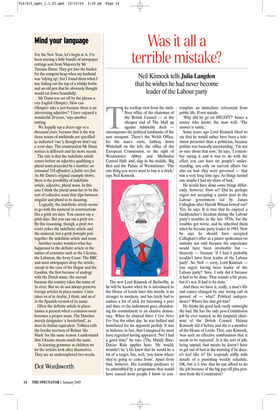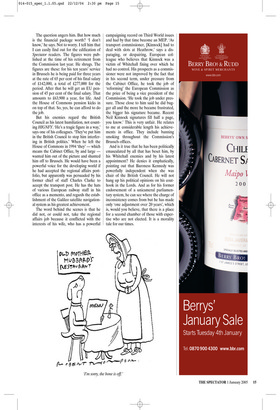Was it all a terrible mistake?
Neil Kinnock tells Julia Langdon that he wishes he had never become leader of the Labour party The rooftop view from the sixthfloor office of the chairman of the British Council — at the cheaper end of The Mall up against Admiralty Arch encompasses the political landmarks of the new occupant. There’s the Welsh Office, for the man’s roots, halfway down Whitehall on the left; the office of the European Commission, to the right of Westminster Abbey and Methodist Central Hall; and, slap in the middle, Big Ben and the Palace of Westminster. ‘The one thing you never need to buy is a clock,’ says Neil Kinnock.
The new Lord Kinnock of Bedwellty, as he will be known when he is introduced to the House of Lords later this month, is no stranger to mockery, and has lately had to endure a lot of stick for becoming a peer and thus, so the indictment goes, abandoning his commitment to an elective democracy. When he chaired Have I Got News For You the other day, he was bullied and humiliated for his apparent perfidy. It was so hideous, in fact, that I imagined he must have regretted having appeared. ‘No! I had a good time!’ he says. (The Mandy RiceDavies Rule applies here: ‘He would, wouldn’t he.’) He knew that he would be a bit of a target, but, well, ‘you know where they’re going to come from’. Apart from that, however, His Lordship professes to be untroubled by a programme that would have caused most people I know to con template an immediate retirement from public life. If not suicide.
‘Why did he go on HIGNFY?’ hisses a source who knows the man well. ‘The answer is vanity.’ Some years ago Lord Kinnock liked to say that he would rather have been a television presenter than a politician, because politics was basically unrewarding. ‘I’m not so sure about that now,’ he says. ‘I remember saying it and it was to do with the effect you can have on people’s understanding, not only on current affairs but also on how they were governed — that was a very long time ago. As things turned out, maybe I had my share of luck.’ He would have done some things differently, however. How so? Did he perhaps regret not accepting a junior post in the Labour government led by James Callaghan after Harold Wilson bowed out? Yes, he says. It is true that he enjoyed a backbencher’s freedom during the Labour party’s troubles in the late 1970s, but the troubles got worse, and he inherited them when he became party leader in 1983. Now he says he should have accepted Callaghan’s offer as a junior spokesman on industry not only because the experience would have been invaluable but bizarrely — because ‘if I had I probably wouldn’t have been leader of the Labour party’. So, Neil — sorry, Lord Kinnock you regret having been leader of the Labour party? ‘Sure. I only did it because it had to be done. That sounds a bit pious, but it’s not. It had to be done.’ And there we have it, really, a man’s life and career changed by one wrong call in pursuit of — what? Political independence? Where has that got him?
He thinks his good luck vastly outweighs the bad. He has the only post-Commission job he ever wanted, as the (unpaid) chairman of the British Council. Helena Kennedy did it before and she is a member of the House of Lords. That, says Kinnock, ‘was such an effective combination that it needs to be repeated’. Is it the sort of job, being unpaid, that means he doesn’t have to get out of bed in the morning if he doesn’t feel like it? He responds stiffly with details of a punishing weekly schedule. OK, but is it true that he can afford to do the job because of the big pay-off plus pension from the Commission? The question angers him. But how much is the financial package worth? ‘I don’t know,’ he says. Not to worry. I tell him that I can easily find out for the edification of Spectator readers. The figures were published at the time of his retirement from the Commission last year. He shrugs. The figures are these: for his ten years’ service in Brussels he is being paid for three years at the rate of 65 per cent of his final salary of £142,000, a total of £277,000 for the period. After that he will get an EU pension of 45 per cent of the final salary. That amounts to £63,900 a year, for life. And the House of Commons pension kicks in on top of that. So, yes, he can afford to do the job.
But his enemies regard the British Council as his latest humiliation, not counting HIGNTY. ‘He’s a tragic figure in a way,’ says one of his colleagues. ‘They’ve put him in the British Council to stop him interfering in British politics.’ When he left the House of Commons in 1994 ‘they’ — which means the Cabinet Office, by and large wanted him out of the picture and shunted him off to Brussels. He would have been a powerful voice for the developing world if he had accepted the regional affairs portfolio, but apparently was persuaded by his former chief of staff Charles Clarke to accept the transport post. He has the hats of various European railway staff in his office as a memento, and regards the establishment of the Galileo satellite navigational system as his greatest achievement.
The word behind the scenes is that he did not, or could not, take the regional affairs job because it conflicted with the interests of his wife, who has a powerful campaigning record on Third World issues and had by that time become an MEP. ‘As transport commissioner, [Kinnock] had to deal with slots at Heathrow,’ says a disparaging, or despairing, European colleague who believes that Kinnock was a victim of Whitehall fixing over which he had no control. His prospects as a commissioner were not improved by the fact that in his second term, under pressure from the Cabinet Office, he took the job of ‘reforming’ the European Commission as the price of being a vice president of the Commission. ‘He took the job under pressure. Those close to him said he did bugger all and the more he became frustrated, the bigger his signature became. Recent Neil Kinnock signatures fill half a page, you know.’ This is very unfair. He relates to me at considerable length his achievements in office. They include banning smoking throughout the Commission’s Brussels offices.
And is it true that he has been politically emasculated by all that has beset him, by his Whitehall enemies and by his latest appointment? He denies it emphatically, pointing out that Baroness Kennedy was powerfully independent when she was chair of the British Council. He will not hang up his political opinions on his coathook in the Lords. And as for his former endorsement of a unicameral parliamentary system, he can see where the charge of inconsistency comes from but he has made only ‘one adjustment over 20 years’, which is, would you believe, that there is a place for a second chamber of those with expertise who are not elected. It is a morality tale for our times.








































 Previous page
Previous page